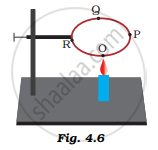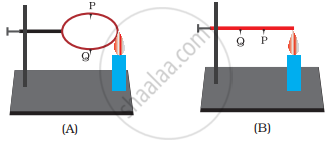Advertisements
Advertisements
Question
Write scientific reason.
In the cold regions, snow falls in winter.
Solution
- Snow is formed high in the clouds from water vapour.
- In cold regions when the temperature is extremely low, water vapour freezes around smoke or dust particles forming ice crystals.
- When these ice particles combine with each other they turn heavy and start falling to the ground.
This gives rise to snowfall in cold regions in winter.
APPEARS IN
RELATED QUESTIONS
Fill in the blank
Heat is a form of _______.
Name the mode of transfer of heat in the following :
(a) solid,
(b) liquid,
(c) gas
(d) vacuum
Define the term calorie. How is it related to joule (the S.I. unit of heat)?
What will absorb heat?
Wax
The unit of heat is
Define one calorie.
Why does the bottom of a lake not freeze in severe winter though the surface is all frozen?
Calorie is the unit of ______.
When an electric current is passing through the conductor ______ energy is produced.
To keep her soup warm Paheli wrapped the container in which it was kept with a woollen cloth. Can she apply the same method to keep a glass of cold drink cool? Give a reason for your answer.
A circular metal loop is heated at point O as shown in Figure 4.6.

(i) In which direction would heat flow in the loop?
(ii) In which order are the pins at points P, Q and R fixed with the help of wax fall if points O, P, Q and R are equidistant from each other?
In arrangements, A and B shown in Figure 4.7, pins P and Q are fixed to a metal loop and an iron rod with the help of wax. In which case are both the pins likely to fall at different times? Explain.

The water in the black can becomes ______ than that in a white can after exposure to the sun.
Assertion: Small gaps left between railway lines.
Reason: It allows for the contraction of rails during summer.
Arrange the following in order of decreasing the expansion of heating: Steel, milk, air.
What is heat energy?
Match the following:
| Column A | Column B | ||
| 1. | Heat | a. | Heat gained or lost in the change of state without any change in temperature |
| 2. | m × L. | b. | Heat gained or lost when there is no change of state |
| 3. | Temperature | c. | Form of energy |
| 4. | m × s × t | d. | SI unit of specific latent heat |
| 5. | J/Kg | e. | degree of hotness or coldness |
Heat gained by a body depends upon which factors?
